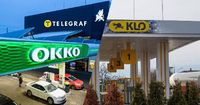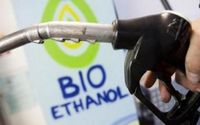In a significant shift for the Ukrainian fuel market, gas stations across the country have begun selling a new type of gasoline, known as E5, which contains an alcohol additive. This move comes as Ukraine prepares to implement a mandatory biofuel quota starting May 1, 2025. The first companies to introduce this new fuel were AMIC and WOG, with AMIC receiving a shipment of 0.92 thousand tons from OMV Petrom on April 10, 2025, while WOG imported 1.6 thousand tons from Orlen Lietuva.
During the same week, WOG also brought in an additional 3.4 thousand tons of Lithuanian gasoline that contains 4.8% bioethanol. Meanwhile, the OKKO chain secured fuel from two suppliers: 3.4 thousand tons from a Lithuanian company and 0.8 thousand tons from a Romanian company. Furthermore, OKKO has cleared an extra batch of fuel from PCK Schwedt in Germany, amounting to 1.8 thousand tons, and another 1.8 thousand tons from OMV Petrom. These developments are part of Ukraine's broader strategy to integrate biofuels into its energy supply, as European refineries ramp up production of bioethanol for the Ukrainian market.
As the new fuel types roll out, the landscape of the fuel market is undergoing dramatic changes. OKKO has recently leased the entire network of KLO gas stations, which includes 57 sites. This decision marks a pivotal moment in the industry, especially as KLO has faced significant challenges since 2022, including a sharp decline in sales, occupation of some facilities, and damage to gas station complexes.
Experts like Serhiy Kuyun have noted that the fuel market in Ukraine is on the brink of serious transformation in 2025. The KLO network, founded in 1995, has over 70 gas station complexes equipped with restaurants, shops, cafes, car washes, and electric vehicle charging stations located in several regions, including Kyiv, Zhytomyr, Chernihiv, and Lviv. Kuyun describes the KLO network as a "really cool network, with some stations being true works of art," emphasizing its strategic location in a high-demand area that accounts for over 20% of fuel sales nationwide.
However, the KLO network has encountered numerous obstacles, including significant drops in sales, destruction of facilities, and operational restrictions due to infrastructure issues. The most devastating blow came from a hostile attack on the company's oil depot, where it was estimated that up to 10 thousand tons of gasoline, valued at approximately $10 million, were stored.
In addition to the changes at KLO, the market is also watching the future of other gas station chains previously owned by Ihor Kolomoisky, such as Avias and ANP. These chains, which number over 600 gas stations, are currently not operational but may return to the market soon, potentially disrupting existing competitors.
Meanwhile, gasoline prices in Ukraine have seen a noticeable decline. As of April 15, 2025, the average price of A-95 gasoline stands at UAH 55.11 per liter, down by 54 kopecks from the previous week. Experts predict that this downward trend will continue, with prices expected to decrease by an additional 50 kopecks to UAH 1 per liter by the end of the week.
According to the Consulting Group A-95, major gas station networks are currently selling gasoline at prices ranging from UAH 49.4 to UAH 57.99 per liter. The highest prices are found at WOG, OKKO, and Rur Group at UAH 57.99 per liter, while Shell closely follows at UAH 57.95. On the other end of the spectrum, RLS gas stations offer the lowest prices at UAH 49.4 per liter, with Avantazh 7 at UAH 49.95, Market at UAH 49.99, and Factor at UAH 51.
Industry analysts anticipate that gasoline prices will continue to trend downward over the next three weeks, potentially falling by as much as UAH 3 per liter. However, gas stations may be cautious in implementing these price reductions, with large networks expected to lower prices by UAH 0.5 to UAH 1 per liter this week, followed by other market participants.
Despite the positive news regarding lower gasoline prices, concerns remain about the quality of fuel available at gas stations. Reports indicate that substandard gasoline can cause significant damage to vehicles, including the destruction of fuel filters and pumps. Moreover, the practice of diluting fuel by lowering its octane rating can lead to uneven combustion in engines, further exacerbating the issue.
As the Ukrainian fuel market navigates these changes, stakeholders are keeping a close eye on the evolving landscape. The introduction of new fuel types, the leasing of gas station networks, and fluctuating gasoline prices all point to a year of substantial transformation ahead. With the implementation of the biofuel quota and the potential re-emergence of previously inactive gas stations, 2025 promises to be a defining year for the industry.






